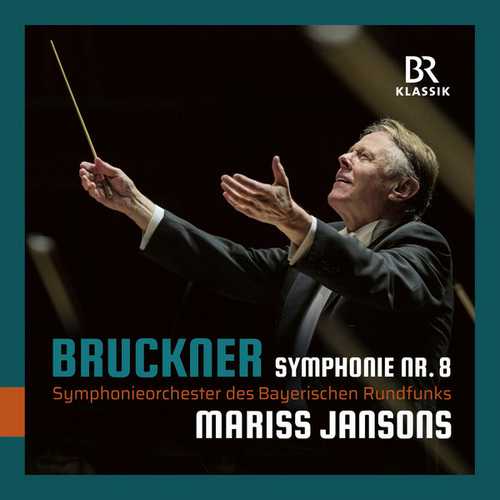

Composer: Anton Bruckner
Orchestra: Symphonie-Orchester des Bayerischen Rundfunks
Conductor: Mariss Jansons
Format: FLAC (tracks)
Label: BR Klassik
Catalogue: 900165
Release: 2018
Size: 762 MB
Recovery: +3%
Scan: yes
Symphony No. 8 in C minor
01. I. Allegro moderato
02. II. Scherzo. Allegro moderato
03. III. Adagio
04. IV. Finale. Feierlich, nicht schnell
The genesis of Anton Bruckner’s Eighth Symphony was perhaps ignited by a bout of sudden fame that boosted the composer’s constantly shaky self-confidence. After the performance of Bruckner’s Seventh, the famous conductor Hermann Levi had hailed him as “the greatest symphonist since the death of Beethoven”. Frequently ridiculed in Vienna, Bruckner had finally been taken seriously in Munich: his importance had been recognized, and the Austrian emperor had awarded him the Order of Franz Joseph – something that filled the composer with pride. In the summer of 1884 he set to work on a new symphony, returning this time to C minor, the key of his first two symphonies.
This key had an especially powerful symphonic precedent in Beethoven’s Fifth, and virtually challenged him to make the journey per aspera ad astra (“through the night to the light”). He wanted to create the greatest instrumental symphony of all time; its scale became gigantic, placing huge demands on performers and audience alike. The incomparably bold design of the finale probably represents the longest and most daring sonata-form movement ever written; Bruckner referred to it as “the most important movement of my life”. Towards the end of it, when the main themes of all four movements sound simultaneously, he wrote a euphoric “Hallelujah!” into the draft.
In August 1887, after three years of work, the symphony was completed, but because of energetic objections from Levi it was not immediately performed. Bruckner revised his work thoroughly between October 1887 and March 1890, and the premiere of the Eighth Symphony in its new version finally took place on December 18, 1892, performed by the Vienna Philharmonic under Hans Richter. It was an extraordinary success. Hugo Wolf described the concert as follows: “It was an absolute victory of light over darkness, and the storm of delighted applause was like some elemental manifestation of nature. In short, it was a triumph as complete as any Roman emperor could have wished for.”
Since then, Bruckner’s Eighth Symphony has been an integral part of the symphonic repertoire, yet it still continues to present a huge challenge to performers. Mariss Jansons and the musicians of the Symphonieorchester des Bayerischen Rundfunks are however more than equal to the extraordinary demands made by this masterpiece. The recording of the Munich concert event of November 2017 has now been released on CD by BR-KLASSIK: it is an exemplary performance of one of the most important compositions of the Late Romantic symphonic repertoire, in its version of 1890.
While he has been astonishingly prolific as a recording artist, with a strong affinity for late Romantic classics, Mariss Jansons has comparatively few Bruckner recordings to his credit, with only one previous release for BR Klassik of the Symphony No. 7 in E major. However, Jansons’ second Bruckner offering for the label, a live performance of the Symphony No. 8 in C minor, demonstrates an assurance and authority one might associate with the great Bruckner conductors of the past. Using the 1890 version edited by Leopold Nowak, Jansons conducts the Bavarian Radio Symphony Orchestra in a live performance that is riveting throughout, balancing the work’s dark expressions with its poignant lyricism and creating an impression of wholeness that may remind listeners of the interpretations of Günter Wand or Klaus Tennstedt. Timed here at an hour and 27 minutes, this massive symphony is an endurance test that would break a lesser orchestra, but Jansons guides the musicians to its conclusion with steady pacing and decisive power, and a feeling of unity comes across in the orchestra’s committed playing. The sound of the recording is exceptional by any standard and superb for a concert recording, so even the murkiest parts of Bruckner’s heavy orchestration can be heard clearly, and inner details are emphasized without studio manipulation.



